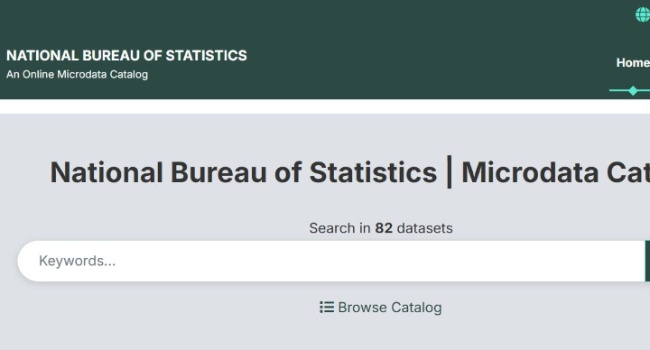The National Bureau of Statistics (NBS) website is back online after 29 days of being inaccessible due to a cyberattack.
On December 18, 2024, the bureau confirmed the hack.
Checks by TheCable showed that the website has been restored. However, the controversial crime experience and security perception report is no longer available on the website.
NBS website was hacked 24 hours after the bureau published the crime experience and security perception survey.
Advertisement
In the report, the NBS said Nigerians paid N2.23 trillion as ransom in one year between May 2023 and April 2024.
The bureau indicated that an estimated 51.89 million crime incidents were recorded across Nigerian households during the period.
NBS said the north-west recorded the highest crime incidents, estimated to be over 14 million, while the south-east has the least with over six million cases.
Advertisement
The report also shows that the crime incidence in the rural area (26,526,069) was higher than that of the urban area (25,360,963).
After the publication of the survey, media reports claimed that Adeniran Adeyemi, statistician-general of the federation, was invited for questioning by the Department of State Services (DSS) on the methodology and data used in the report.
But Ichedi Sunday, head of communications at the NBS, told TheCable the arrest claim “is not true”.
According to Sunday, the statistician-general was never called by the DSS for interrogation.
Advertisement
MPC MEETING ALREADY RESCHEDULED
On November 25th and 26th, 2024, the monetary policy committee (MPC) of the Central Bank of Nigeria (CBN) held its 298th meeting to assess recent economic and financial developments, as well as evaluate the risks to Nigeria’s economic outlook.
After the meeting, the committee issued a communiqué, setting the next MPC meeting for January 25 and 28, 2025.
However, TheCable observed that the apex bank has rescheduled the meeting to February 17 and 18, 2025. after the hack delayed NBS from publishing the inflation report for December 2024.
Advertisement
Under the updated schedule, the MPC is expected to meet five times in 2025, with the first meeting now planned for February.
According to Muhammad Bello, an economist, the implications that the NBS website has not been inaccessible for over 29 days extend beyond mere inconvenience.
Advertisement
“The delay in economic policy responses, loss of confidence and interest by investors, decreased trust in government, and the potential loss of credibility for the NBS as an institution are significant concerns,” Bello told TheCable.
“Most potential investors (foreign) rely on some of the statistics being published out there even though they are faulty sometimes to make investment decisions, so imagine you as an investor having this experience and information about what resulted to the website going down. What would be your thoughts about investing in a country like that?
Advertisement
“Government and every policy-making institution relies on the statistics to develop policies, including the CBN. You’ve heard of the MPC being suspended till the next month because there are no inflation statistics to reflect and decide what the interest rates should be.”
Also, Segun Sanni, an economist and retired banker, raised concerns about the safety of old data and whether it has been adequately backed up.
Advertisement
Speaking before the NBS website was restored, Sanni said the bureau and CBN are the principal sources of the major economic and socioeconomic data concerning Nigeria.
“The NBS is currently in the process of rebasing the Nigerian GDP. A lot of data would have been collected and a lot of work done in that process,” he said.
“Are the data still available and the extensive work done not compromised for the GDP rebasing exercise?”
The economist said the hack prevented investors, analysts, researchers, and policymakers from accessing critical data.
Add a comment












